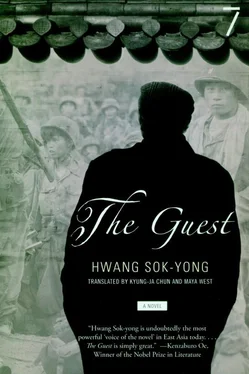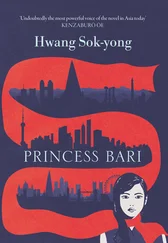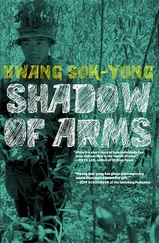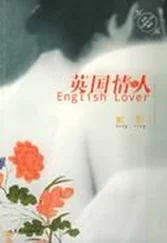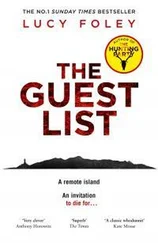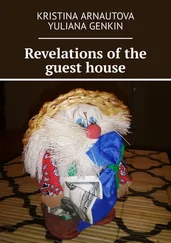I told you, that’s why my friends are waiting to take me with them.
Then, in the blink of an eye, the phantom disappeared. Yosŏp lay down again to the endless sound of rain.

The rain stopped the next morning, but the sky remained murky. Everyone was up early, making a fuss over setting the breakfast table just as they had over dinner the night before. Yosŏp saw his sister-in-law open the side gate along the hedge fence and walk into the front yard. She held a hoe and a bunch of flowers in one hand. From the doorway of the living room where he’d been sitting, Yosŏp called out to her.
“Where did you go so early in the morning?”
“To pick some flowers. no flowers in the neighborhood. I’ve been all the way to that hill over there.”
“What kind of flowers are they?”
“Ah, this, these are. what-do-you-call-them. Siberian chrysanthemums.”
She held up the bundle, revealing a cluster of yellow pistils nestled inside the white petals, and came up into the room. Using a pair of scissors, she trimmed the stems evenly. Then she walked over to the kitchen and said to her daughter-in-law, “What, don’t we have a bottle or something? Fill one with water for me.”
Tanyŏl’s wife handed her a soda bottle filled with water, and the old lady put one stem at a time, each at a different height, into the mouth of the bottle. When she was through, she sat back and gazed at her handiwork. Walking into the main bedroom, she called out to Yosŏp.
“Come in here.”
Yosŏp entered the room and was slightly taken aback. The dining table had been pushed up against the wardrobe, and although the rice and soup and other side dishes weren’t arranged in any ceremonial fashion, they were obviously set for a purpose other than that of a regular family meal. Yosŏp’s sister-in-law placed the flower bottle carefully at the head of the table. Bewildered, Yosŏp asked her, “What’s all this?”
“I know it’s not the old way, but these days this is how people around here make do.”
“But who is this chesa 35for?”
“Who else? Who but that poor ghost? It’s for the man who died so far from home.”
While they were talking, Tanyŏl, his wife, and their children had entered the room, all washed up and dressed neatly. Yosŏp had performed memorial services often enough, but this was his first time at a traditional chesa for one’s ancestors, especially in a Christian household. He just sat there with his mouth shut, feeling awkward. His sister-in-law looked at her son.
“What are you gawking at? Come on now, bow,” she chided.
At a silent sign from Tanyŏl, the family of four got to their feet and lined up, single file. They bowed towards the head of the table, one half bow followed by two full bows. Then, like well-behaved children, they all sat down quietly along the wall. They sat like that for a long while, silent, their heads lowered. Again, it was his sister-in-law who broke the silence.
“Go ahead and pray,” she blurted out. “You, Brother-in-law, you don’t live here — you’re not from here, so it shouldn’t matter if you pray.”
“Mother. ” Tanyŏl began, raising his voice, but his mother stopped him.
“I say it shouldn’t matter. Besides, a ghost won’t understand if you don’t speak his language, no?”
“What’s all this talk about ghosts in front of the children?”
Turning to her grumbling son, the mother spoke freely.
“They live inside you, inside me — they’re everywhere. Come, say your prayer.”
Yosŏp hesitated for a moment but ultimately reached into his inner pocket for his Bible.
“This is a book, so. instead of saying a prayer I’ll just read a passage from the Bible.”
As he began to thumb through it, a random passage caught his eye.
“What have you done? Listen; your brother’s blood is crying out to me from the ground! And now you are cursed from the ground, which has opened its mouth to receive your brother’s blood from your hand. When you till the ground, it will no longer yield to you its strength; you will be a fugitive and a wanderer on the earth.”
Cain said to the LORD, “My punishment is more than I can bear.”
Yosŏp flipped to a different page and continued to read out loud.
While they were eating, Jesus took a loaf of bread, and after blessing it he broke it, gave it to the disciples, and said, “Take, eat; this is my body.” Then he took a cup, and after giving thanks he gave it to them, saying, “Drink from it, all of you; for this is my blood of the covenant, which is poured out for many for the forgiveness of sins. I tell you, I will never again drink of this fruit of the vine until that day when I drink it new with you in my Father’s kingdom.”
Yosŏp closed the Bible and returned it to his pocket. No one spoke until his sister-in-law said to her daughter-in-law, “Now, now, hurry up and bring in the breakfast. The children will be late for school.”
They brought in the rice and soup, and everyone ate in silence. As soon as the children had said their good-byes and left, Yosŏp’s sister-in-law asked him to come to her room. Once there, she took out a small bundle from her chest of drawers and pushed it towards him, saying, “Take it with you.”
“What. is it?”
Instead of answering, the old lady began untying the bundle. Inside was a pair of worn-out underwear, discolored to a darkish yellow, full of holes where the stitches had come undone and blackened all over with large stains.
“It belongs to him. Burn it, and put it together with his bone when you bury it in Ch’ansaemgol. I used it to wrap Tanyŏl when he was born.”
Yosŏp took the bundle in silence and tied it back up. He packed it in the small bag he had brought, with his own underwear and toiletries.
The jeep didn’t arrive until after ten o’clock, carrying the guide from the City Authority. Tanyŏl, his wife, and Yosŏp’s sister-in-law bid Yosŏp farewell from the hedge fence. Tanyŏl and his wife were the first to say good-bye and bow.
“Uncle, come and visit your fatherland often from now on. Don’t forget the warm consideration the Party has given you, and always, the unification of our nation.”
“Yes, yes, I understand. Take good care of your mother and write to me at the address I gave you. Be sure to contact me if your mother happens to fall ill — I’ll send you money or medicine.”
With that, Yosŏp turned back to his sister-in-law.
“Sister-in-law, stay in good health. Next time I come, I’ll bring my wife, too.”
Her voice breaking as she held back her tears, Sister-in-law replied, “Well, see if you can bring his children, too — the ones born over there. One was Samuel, right? And. I forgot the other’s name.”
“One’s called Samyŏl and the other Pillip.”
“Yes, that’s right. The world is theirs now. It’s time for us to move on — please, bury it without fail.”
Yosŏp said good-bye once more and went to get in the jeep. His sister-in-law stood in front of the hedge fence for a long, long time, long after the car had driven away, disappearing around the corner at the end of the alleyway.

The first big snowfall hasn’t come yet, but the hill behind the village is covered in a thin blanket of white. The ground has frozen over and thawed out so many times that you can hear the crunch of ice breaking. There isn’t a dog to be heard in the entire village. Ever since the start of autumn, those young men — the ones who’ve been hanging around here, claiming to be guarding the bend in the road — all this time, they’ve probably been gobbling up all the dogs they can get their hands on. For months now, people haven’t been going out. Already there are over thirty empty houses, and these days if you go out into the alley after dark you feel like a pair of bony hands will jump out of one of those empty doorways and grab you by the nape of the neck.
Читать дальше
